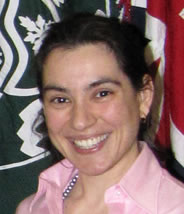Dr Androula Yiakoumetti, Oxford Brookes University

Dr Androula Yiakoumetti is an applied linguist whose research focuses on regional and social variation within linguistic systems and, more specifically, on the implications of such variation for education. She is interested in sociolinguistic aspects of linguistic variation and works within the research fields of multidialectism and multilingualism, second-language acquisition and development, and language-teacher development.
Her publications span a variety of language issues including bidialectism, language attitudes, learning English as a foreign language, language policy and practice in an era of super-diversity, and language-teacher training.
She is the editor of Harnessing Linguistic Variation to Improve Education (2012, Peter Lang) and Multilingualism and Language in Education: Sociolinguistic and Pedagogical Perspectives from Commonwealth Countries (2015, Cambridge University Press).
Abstract: Utilising Linguistic Variation for Better Education
Language in education deserves heightened attention in the increasingly linguistically-diverse classrooms that are typical of a modern world that is characterised by processes of globalisation, transnationalism and transmigration. These processes have inextricable linkages with language power relations. It is imperative then that we ask how language education can be optimised in settings where language power relations are based on economic, political or social factors rather than linguistic processes.
Research clearly demonstrates that incorporating linguistic diversity into education and utilising the entire linguistic repertoire of learners can lead to social, cultural, pedagogical, cognitive and linguistic advancement. In spite of this evidence, many educational contexts worldwide continue to promote the exclusive use of traditionally-dominant languages.
I draw on research carried out in various settings (including Australia, Canada, Cyprus, and the United States) which (1) highlights the valuable educational roles of learners’ mother tongues and (2) evidences the positive role that translanguaging practices can play in education. In doing so, I argue for the promotion of Indigenous languages, minority languages, Creoles and nonstandard varieties in formal education alongside those which are traditionally dominant. I emphasise the central significance of language educators, the importance of teacher training, and the need for creating educational programmes which are informed by the specific linguistic landscapes in which they are to be employed. I also emphasise the importance of language attitudes and the benefits derived when parents and other community members are involved in students’ language education.
In drawing together advice on the optimisation of language education in linguistically diverse settings, I conclude that both low-status and traditionally-prestigious varieties ought to be concurrently used for ideal educational outcomes. I therefore argue in favour of both multilingualism and multiculturalism while pointing out how timely a much desired paradigm shift in language education planning would be.
